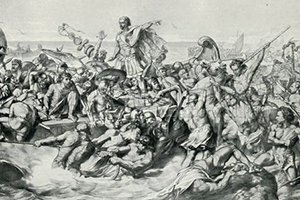
History-Conflict
The Military history of England

From Roman Wars to Afghanistan
Explore 2 thousand years of war

With Ceasar's invasion we can traverse the annals of time to a period when Rome, in its grandeur and might, cast its gaze upon the isles to its north – Britain:
"In the twilight of the Roman Republic, before the rise of its majestic Empire, there stood a colossus: Gaius Julius Caesar. By 55 BC, Caesar had subjugated much of Gaul, present-day France and Belgium, under Roman rule. But to the north lay a mysterious land, spoken of in hushed tones, a place of ancient druids and fierce tribes – Britannia.
Caesar's motivations for the invasion were manifold. First, during his campaigns in Gaul, tribes from Britain had often supported his Gallic enemies, proving to be a thorn in his side. Moreover, the allure of Britain's riches, notably its pearls and precious metals, beckoned the Romans. But beyond the tangible, there was the intangible – the glory and prestige of being the first Roman to conquer this unknown land, a feather in the cap for any ambitious Roman.
The forces that awaited Caesar in Britain were disparate. Britain was not a unified nation as we understand it today but a patchwork of tribes, each with its leaders and warriors. Chief among them were the powerful Catuvellauni, led by the formidable chieftain Cassivellaunus.
In 55 BC, Caesar launched his first expedition. With a fleet of ships, he crossed the English Channel, only to be met by a host of British warriors on the shores. The Britons, though less organised than the Romans, displayed a fierce spirit and adopted guerrilla tactics. They harried the Roman forces, using their knowledge of the terrains to their advantage. But the disciplined legions of Rome, veterans of many campaigns, were not so easily deterred. Despite establishing a foothold, Caesar's first expedition faced several challenges, including storms damaging his ships. Recognising the difficulties, Caesar decided to return to Gaul for the winter, but not before demanding hostages from the British tribes as a token of their submission.
Undeterred, in 54 BC, Caesar launched a more ambitious second invasion. With a much larger force, he landed and faced an organised resistance led by Cassivellaunus. Several battles ensued, the most notable being the assault on the fortress of the Catuvellauni. Though the Britons resisted valiantly, the superior tactics, equipment, and experience of the Roman legions began to tell. Cassivellaunus, seeing the might of Rome and the futility of further resistance, sued for peace.
Caesar, his point made and with winter approaching, agreed. He imposed a yearly tribute on the tribes and returned to Gaul. While the Romans did not establish a permanent presence in Britain until nearly a century later under Emperor Claudius, Caesar's invasions were significant. They marked the beginning of Britain's entanglement with the Roman world, an association that would deeply influence its culture, politics, and destiny for centuries to come.
And thus, as the mists of time swirl, one discerns the ambitions and dreams of great men and nations. Caesar’s expeditions to Britain were but a prologue to a grander saga, a tale of empires and isles, forever intertwined in the dance of destiny."
If you have a suggestion regarding additional topics you would like to see included - please let us know
Reference: Article by Greg Scott (Staff Historian), 2024
